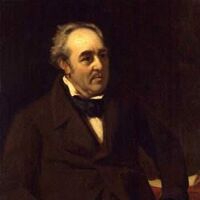Gebir (Fifth Book)
FIFTH BOOK.
Once a fair city, courted then by king,
Mistress of nations, thronged by palaces,
Raising her head o’er destiny, her face
Glowing with pleasure and with palms refreshed,
Now pointed at by Wisdom or by Wealth,
Bereft of beauty, bare of ornaments,
Stood in the wilderness of woe, Masar.
Ere far advancing, all appeared a plain;
Treacherous and fearful mountains, far advanced.
Her glory so gone down, at human step
The fierce hyena frighted from the walls
Bristled his rising back, his teeth unsheathed,
Drew the long growl and with slow foot retired.
Yet were remaining some of ancient race,
And ancient arts were now their sole delight:
With Time’s first sickle they had marked the hour
When at their incantation would the Moon
Start back, and shuddering shed blue blasted light.
The rifted rays they gathered, and immersed
In potent portion of that wondrous wave,
Which, hearing rescued Israel, stood erect,
And led her armies through his crystal gates.
Hither (none shared her way, her counsel none)
Hied the Masarian Dalica: ‘twas night,
And the still breeze fell languid on the waste.
She, tired with journey long and ardent thoughts
Stopped; and before the city she descried
A female form emerge above the sands.
Intent she fixed her eyes, and on herself
Relying, with fresh vigour bent her way;
Nor disappeared the woman, but exclaimed,
One hand retaining tight her folded vest,
’Stranger, who loathest life, there lies Masar.
Begone, nor tarry longer, or ere morn
The cormorant in his solitary haunt
Of insulated rock or sounding cove
Stands on thy bleached bones and screams for prey.
My lips can scatter them a hundred leagues,
So shrivelled in one breath as all the sands
We tread on could not in as many years.
Wretched who die nor raise their sepulchre!
Therefore begone.'
But Dalica unawed
(Though in her withered but still firm right—hand
Held up with imprecations hoarse and deep
Glimmered her brazen sickle, and enclosed
Within its figured curve the fading moon)
Spake thus aloud. 'By yon bright orb of Heaven,
In that most sacred moment when her beam
Guided first thither by the forked shaft,
Strikes through the crevice of Arishtah’s tower—'
‘Sayst thou?’ astonished cried the sorceress,
'Woman of outer darkness, fiend of death,
From what inhuman cave, what dire abyss,
Hast thou invisible that spell o’erheard?
What potent hand hath touched thy quickened corse,
What song dissolved thy cerements, who unclosed
Those faded eyes and filled them from the stars?
But if with inextinguished light of life
Thou breathest, soul and body unamerced,
Then whence that invocation? who hath dared
Those hallowed words, divulging, to profane?'
Dalica cried, ‘To heaven, not earth, addressed,
Prayers for protection cannot be profane.’
Here the pale sorceress turned her face aside
Wildly, and muttered to herself amazed;
‘I dread her who, alone at such an hour,
Can speak so strangely, who can thus combine
The words of reason with our gifted rites,
Yet will I speak once more.—If thou hast seen
The city of Charoba, hast thou marked
The steps of Dalica?’
‘What then?’
‘The tongue
Of Dalica has then our rites divulged.’
‘Whose rites?’
'Her sister’s, mother’s, and her own.'
‘Never.’
‘How sayst thou never? one would think,
Presumptuous, thou wert Dalica.’
‘I am,
Woman, and who art thou?’
With close embrace,
Clung the Masarian round her neck, and cried:
'Art thou then not my sister? ah, I fear
The golden lamps and jewels of a court
Deprive thine eyes of strength and purity.
O Dalica, mine watch the waning moon,
For ever patient in our mother’s art,
And rest on Heaven suspended, where the founts
Of Wisdom rise, where sound the wings of Power;
Studies intense of strong and stern delight!
And thou too, Dalica, so many years
Weaned from the bosom of thy native land,
Returnest back and seekest true repose.
Oh, what more pleasant than the short—breathed sigh
When laying down your burden at the gate,
And dizzy with long wandering, you embrace
The cool and quiet of a homespun bed.'
‘Alas,’ said Dalica, 'though all commend
This choice, and many meet with no control,
Yet none pursue it! Age by Care oppressed
Feels for the couch, and drops into the grave.
The tranquil scene lies further still from Youth:
Frenzied Ambition and desponding Love
Consume Youth’s fairest flowers; compared with Youth
Age has a something something like repose.
Myrthyr, I seek not here a boundary
Like the horizon, which, as you advance,
Keeping its form and colour, yet recedes;
But mind my errand, and my suit perform.
Twelve years ago Charoba first could speak:
If her indulgent father asked her name,
She would indulge him too, and would reply
‘What? why, Charoba!’ raised with sweet surprise,
And proud to shine a teacher in her turn.
Show her the graven sceptre; what its use?
‘Twas to beat dogs with, and to gather flies.
She thought the crown a plaything to amuse
Herself, and not the people, for she thought
Who mimic infant words might infant toys:
But while she watched grave elders look with awe
On such a bauble, she withheld her breath;
She was afraid her parents should suspect
They had caught childhood from her in a kiss;
She blushed for shame, and feared—for she believed.
Yet was not courage wanting in the child.
No; I have often seen her with both hands
Shake a dry crocodile of equal height,
And listen to the shells within the scales,
And fancy there was life, and yet apply
The jagged jaws wide open to her ear.
Past are three summers since she first beheld
The ocean; all around the child await
Some exclamation of amazement here:
She coldly said, her long—lashed eyes abased,
’Is this the mighty ocean? is this all!'
That wondrous soul Charoba once possessed,
Capacious then as earth or heaven could hold,
Soul discontented with capacity,
Is gone, I fear, for ever. Need I say
She was enchanted by the wicked spells
Of Gebir, whom with lust of power inflamed
The western winds have landed on our coast?
I since have watched her in each lone retreat,
Have heard her sigh and soften out the name,
Then would she change it for Egyptian sounds
More sweet, and seem to taste them on her lips,
Then loathe them—Gebir, Gebir still returned.
Who would repine, of reason not bereft!
For soon the sunny stream of youth runs down,
And not a gadfly streaks the lake beyond.
Lone in the gardens, on her gathered vest
How gently would her languid arm recline!
How often have I seen her kiss a flower,
And on cool mosses press her glowing cheek!
Nor was the stranger free from pangs himself.
Whether by spell imperfect, or while brewed
The swelling herbs infected him with foam,
Oft have the shepherds met him wandering
Through unfrequented paths, oft overheard
Deep groans, oft started from soliloquies
Which they believe assuredly were meant
For spirits who attended him unseen.
But when from his illuded eyes retired
That figure Fancy fondly chose to raise,
He clasped the vacant air and stood and gazed;
Then owning it was folly, strange to tell,
Burst into peals of laughter at his woes.
Next, when his passion had subsided, went
Where from a cistern, green and ruined, oozed
A little rill, soon lost; there gathered he
Violets, and harebells of a sister bloom,
Twining complacently their tender stems
With plants of kindest pliability.
These for a garland woven, for a crown
He platted pithy rushes, and ere dusk
The grass was whitened with their roots nipped off.
These threw he, finished, in the little rill
And stood surveying them with steady smile:
But such a smile as that of Gebir bids
To Comfort a defiance, to Despair
A welcome, at whatever hour she please.
Had I observed him I had pitied him;
I have observed Charoba, I have asked
If she loved Gebir.
‘Love him!’ she exclaimed
With such a start of terror, such a flush
Of anger, ‘I love Gebir? I in love?’
And looked so piteous, so impatient looked—
And burst, before I answered, into tears.
Then saw I, plainly saw I, ‘twas not love;
For such her natural temper, what she likes
She speaks it out, or rather she commands.
And could Charoba say with greater ease
Bring me a water—melon from the Nile,’
Than, if she loved him, ‘Bring me him I love.’
Therefore the death of Gebir is resolved.'
‘Resolved indeed,’ cried Myrthyr, nought surprised,
'Precious my arts! I could without remorse
Kill, though I hold thee dearer than the day,
E’en thee thyself, to exercise my arts.
Look yonder! mark yon pomp of funeral!
Is this from fortune or from favouring stars?
Dalica, look thou yonder, what a train!
What weeping! Oh, what luxury! Come, haste,
Gather me quickly up these herbs I dropped,
And then away—hush! I must unobserved
From those two maiden sisters pull the spleen:
Dissemblers! how invidious they surround
The virgin’s tomb, where all but virgins weep.'
‘Nay, hear me first,’ cried Dalica; ‘tis hard
To perish to attend a foreign king.’
‘Perish! and may not then mine eye alone
Draw out the venom drop, and yet remain
Enough? the portion cannot be perceived.’
Away she hastened with it to her home,
And, sprinkling thrice flesh sulphur o’er the hearth,
Took up a spindle with malignant smile,
And pointed to a woof, nor spake a word;
'Twas a dark purple, and its dye was dread.
Plunged in a lonely house, to her unknown,
Now Dalica first trembled: o’er the roof
Wandered her haggard eyes—'twas some relief.
The massy stones, though hewn most roughly, showed
The hand of man had once at least been there:
But from this object sinking back amazed,
Her bosom lost all consciousness, and shook
As if suspended in unbounded space.
Her thus entranced the sister’s voice recalled.
‘Behold it here dyed once again! ’tis done.'
Dalica stepped, and felt beneath her feet
The slippery floor, with mouldered dust bestrewn;
But Myrthyr seized with bare bold—sinewed arm
The grey cerastes, writhing from her grasp,
And twisted off his horn, nor feared to squeeze
The viscous poison from his glowing gums.
Nor wanted there the root of stunted shrub
Which he lays ragged, hanging o’er the sands,
And whence the weapons of his wrath are death:
Nor the blue urchin that with clammy fin
Holds down the tossing vessel for the tides.
Together these her scient hand combined,
And more she added, dared I mention more.
Which done, with words most potent, thrice she dipped
The reeking garb; thrice waved it through the air:
She ceased; and suddenly the creeping wool
Shrunk up with crisped dryness in her hands.
‘Take this,’ she cried, ‘and Gebir is no more.’


